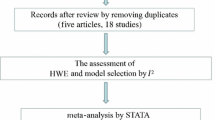Abstract
We identified two single-nucleotide polymorphisms (SNPs) in the human Caspase-9 (CASP9) gene (1p36.3), which encodes an apoptosis-related cysteine protease, by screening all exons and exon-intron boundaries. These SNPs were present in coding regions. One of coding SNPs reflected an amino-acid substitution; an A to G transition at codon 221 in exon 5 would encode arginine instead of glutamine. As the gene is implicated in apoptotic cascade, the polymorphic sites will serve as useful markers for genetic studying of disorders affecting immune response and cancer susceptibility in humans.
Similar content being viewed by others
Author information
Authors and Affiliations
Corresponding author
Additional information
Research support: This work was supported in part by special grants for Strategic Advanced Research on ‘Cancer’ and ‘Genome Science’ from the Ministry of Education, Science, Sports and Culture of Japan; by a Research Grant from the Ministry of Health and Welfare of Japan; and by a Research for the Future Program Grant of The Japan Society for the Promotion of Science.
Rights and permissions
About this article
Cite this article
Hirano, A., Nagai, H., Harada, H. et al. Two novel single-nucleotide polymorphisms of the Caspase-9 (CASP9) gene in the Japanese population . Genes Immun 2, 117–118 (2001). https://doi.org/10.1038/sj.gene.6363728
Received:
Accepted:
Published:
Issue Date:
DOI: https://doi.org/10.1038/sj.gene.6363728
- Springer Nature Limited




